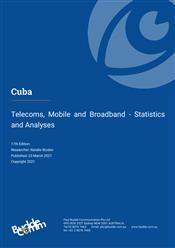Cuba Telecoms Market Report
Telecoms, Mobile and Broadband - Statistics and Analyses

All districts of Havana province to have internet access by end-2021
Cuba’s telecom sector remains a peculiarity, with state control having stymied rather than promoted the development of all sectors. The country has the lowest mobile phone and internet penetration rates in the region, while fixed-line teledensity is also very low. Fixed-line and mobile services remain a monopoly of the government-controlled Empresa de Telecomunicaciones de Cuba (ETESCA Cubacel).
Although there are still state restrictions over the right to own and use certain communications services, a thawing of relations between the US and Cuba has encouraged the government to improve access to services. Since 2015 Wi-Fi hotspots have been put in a number of places and since 2019, Cuba's Ministry of Communications (Mincom) has allowed individuals to create small private not-for-profit Wi-Fi networks and to import cokecommunications equipment.
Access to sites is also tightly controlled and censored. A DSL service was launched in March 2017 in areas of Havana and has since been expanded though costs have been set too high for most Cubans able to access the service. However, in 2019 Google and ETECSA signed an agreement to improve access for Cuba’s internet users by setting up a cost-free and direct connection between their respective networks.
Similarly, LTE services have been launched, with over 473 LTE base stations having been built across the island by the end of 2019. The mobile user base has grown to over six million, 70% of which are smartphone users.
Key developments:
- ETECSA widens LTE service reach, plans to connect all districts of Havana to internet services by end-2021;
- FCC blocks application by ARCOS-1 and ASN to modify cable landing licence to include a landing point in Cuba;
- Cuba reports having an estimated eight million telephone lines, the majority mobile;
- Mincom approves legislation allowing individuals to create small private not-for-profit Wi-Fi networks;
- Report update includes ITU data for 2019, recent market developments.
Companies mentioned in this report:
Empresa de Telecomunicaciones del Cuba (ETESCA), Google, Orange, Telecom Italia, Ericsson, ARCOS-1 USA, A.SurNet, Columbus Networks (CNL)
Related Reports
- 2019 Latin America - Mobile Network Operators and MVNOs
- Caribbean - Telecoms, Mobile and Broadband - Statistics and Analyses
- Panama - Telecoms, Mobile and Broadband - Statistics and Analyses
- Brazil - Telecoms, Mobile and Broadband - Statistics and Analyses
- Chile - Telecoms, Mobile and Broadband - Statistics and Analyses
- Jamaica - Telecoms, Mobile and Broadband - Statistics and Analyses
- Puerto Rico - Telecoms, Mobile and Broadband - Statistics and Analyses
- Uruguay - Telecoms, Mobile and Broadband - Statistics and Analyses
- Paraguay - Telecoms, Mobile and Broadband - Statistics and Analyses
- Suriname - Telecoms, Mobile and Broadband - Statistics and Analyses
Share this Report
TMT Intelligence
A platform to scale your intelligence tasks
Monitor critical insights with our AI-powered Market Intelligence Platform gathering and analyzing intelligence in real time. With AI trained to spot emerging trends and detect new strategic opportunities, our clients use TMT Intelligence to accelerate their growth.
If you want to know more about it, please see:
Research Methodology
BuddeComm's strategic business reports contain a combination of both primary and secondary research statistics, analyses written by our senior analysts supported by a network of experts, industry contacts and researchers from around the world as well as our own scenario forecasts.
For more details, please see:
More than 4,000 customers from 140 countries utilise BuddeComm Research
Are you interested in BuddeComm's Custom Research Service?
Hot Topics
News & Views
Have the latest telecommunications industry news delivered to your inbox by subscribing to BuddeComm's weekly newsletter.